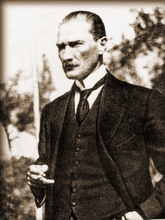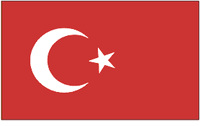A famous statement by the French philosopher Descartes is this: "I think, therefore I am." As I learned earlier, Turkish does not have a separate verb "to be". Given this, what would be the translation for this quote?
My current shot at a translation follows: ben düşün bundan benim
Sunday, January 28, 2007
Office Vocabulary
Several days behind, I'm going to take steps to get caught up.
The first is just to list some words I've picked up at the office. A method I experimented with produced some success. That is, I used sticky notepads to write down the Turkish words of things in my office cubicle and then stick that note onto the object. My idea was to simulate immersion—i.e., simulate being surrounded by a new language.
One of the first words I learned this way was bilgisayar or computer. Seeing that little sticky note every stuck to my computer made it easy to have that word sink into my subconscious.
Using this method, I've learned the following words so far:
This is a handy method though not a be-all-end-all, of course. It's just a good supplement to other efforts.
The first is just to list some words I've picked up at the office. A method I experimented with produced some success. That is, I used sticky notepads to write down the Turkish words of things in my office cubicle and then stick that note onto the object. My idea was to simulate immersion—i.e., simulate being surrounded by a new language.
One of the first words I learned this way was bilgisayar or computer. Seeing that little sticky note every stuck to my computer made it easy to have that word sink into my subconscious.
Using this method, I've learned the following words so far:
- kâğıt (paper)
- şiir (poem, specifically, this one)
- kordon (cord)
- şehir (city [a 1940s picture of the NYC skyline])
- ataş (paperclip)
- fincan (coffee cup)
- bardak (plastic or paper cup)
- duvar (wall)
- masa (table)
- masaüstü (table top)
This is a handy method though not a be-all-end-all, of course. It's just a good supplement to other efforts.
Monday, January 22, 2007
January 2007
Instead of a textbook assignment tonight, I decided to make a simple calendar for January to practice the days of the week. Seeing them in this form makes it easier for me to remember them.
| Pazar | Pazartesi | Salı | Çarşamba | Perşembe | Cuma | Cumartesi |
| _ | 1 | 2 | 3 | 4 | 5 | 6 |
| 7 | 8 | 9 | 10 | 11 | 12 | 13 |
| 14 | 15 | 16 | 17 | 18 | 19 | 20 |
| 21 | 22 | 23 | 24 | 25 | 26 | 27 |
| 28 | 29 | 30 | 31 | _ | _ | _ |
Sunday, January 21, 2007
-im and -iniz
Make-up post since I missed one yesterday.
-im can mean my and -iniz can mean your.
Note: Evidently, the English word is is implied here. Literally translated, "Ceketim güzel" means "my jacket nice". It may feel like pidgin English but it's correct Turkish. So, practice, practice, practice to get over the feeling.
If the word ends ın a vowel, avoid a vowel clash and start with a consonant. For example,
Türkçem my Turkish
bankanız your bank
-im can mean my and -iniz can mean your.
- Ceketiniz siyah. Your jacket is black.
- Ceketim güzel. My jacket is nice.
- Adınız ne? What's your name?
- Bluzunuz bu. This is your blouse.
- Sütünüz soğuk. Your milk is cold.
- Adım Ali. My name is Ali.
- Bu pasaportum. This is my passport.
- Kuaförüm iyi. My hairdresser is good.
Note: Evidently, the English word is is implied here. Literally translated, "Ceketim güzel" means "my jacket nice". It may feel like pidgin English but it's correct Turkish. So, practice, practice, practice to get over the feeling.
If the word ends ın a vowel, avoid a vowel clash and start with a consonant. For example,
Türkçem my Turkish
bankanız your bank
Numbers / Sayılar (iki)
Another textbook assignment—find ten Turkish numbers in this square.
I found 11 (onbir).
on (10)
iki (2)
oniki (12)
sekiz (8)
beş (5)
yirmi (20)
sıfır (0)
yüz (100)
kırk (40)
yarım (0.5)
milyar (1 billion)
Note: Though yarım = 0.5, 1.5 = bir buçuk (which literally means 1 and a half).
| o | n | ğ | ş | b | e | ş | ç |
| n | s | ı | f | ı | r | ö | m |
| i | e | ş | d | f | ü | g | i |
| k | k | b | a | y | ü | z | l |
| i | i | y | ö | i | ğ | v | y |
| ü | z | ğ | z | r | i | r | a |
| y | a | r | ı | m | e | l | r |
| k | ı | r | k | i | ş | t | ö |
I found 11 (onbir).
on (10)
iki (2)
oniki (12)
sekiz (8)
beş (5)
yirmi (20)
sıfır (0)
yüz (100)
kırk (40)
yarım (0.5)
milyar (1 billion)
Note: Though yarım = 0.5, 1.5 = bir buçuk (which literally means 1 and a half).
Friday, January 19, 2007
Motivation / güdülenme
At 52, what is my motivation to learn Turkish? The proximate cause is my best friend's residence in Turkey. The next time I visit, I want to be versed enough in Turkish to talk with strangers as well as with my friend's family and friends.
Beyond that, I find it a fascinating hobby. It's a relaxing extension of my work as a computer programmer. In my work, I am constantly learning new languages. However, they're highly technical, of course. As such, there's a small number of people with whom I can share that language. In contrast, Turkish can be shared with about 200 million people. I like that.
What I also like is that this hobby keeps me mentally sharp. It's like going to the gym and doing weight training. You don't start with the heaviest weights. You work up to them...gradually.
Also, like being at the gym, you don't worry about what the guy next to you is doing. He may be an Arnold S. compared to your 90 pound weakling effort. To focus on that is to drop context, specifically your personal context. So, holding your own in this case means holding your own context. Holding that, you just stick to it and keep pushing yourself to do more and more each day.
Beyond that, I am a lifelong advocate of reason. I have always marveled at the capacity of the human mind and what it can accomplish. My 50+ years have only deepened that conviction. I don't mean just in terms of learning technical stuff and languages. I mean everything, every aspect of life, especially when it comes to morality and emotions, aspects too often relegated to the subjective, mystic realm.
That doesn't mean it's easy. Far from it. It just means that it's possible...with the appropriate effort tempered and guided by a rational, long range perspective.
Armed with that spirit, I'm overcome a rough childhood, dealt with a weak education by educating myself continually after formal schooling, pushed myself across years to unravel the philosophic mess I absorbed from America's culture and to learn a wholly new one grounded solidly in reality, taught myself a set of programming languages sufficiently well enough to make a good living with them and much more.
And the more now includes learning this fascinating language and the intriguing history of its homeland.
Maşallah!
Beyond that, I find it a fascinating hobby. It's a relaxing extension of my work as a computer programmer. In my work, I am constantly learning new languages. However, they're highly technical, of course. As such, there's a small number of people with whom I can share that language. In contrast, Turkish can be shared with about 200 million people. I like that.
What I also like is that this hobby keeps me mentally sharp. It's like going to the gym and doing weight training. You don't start with the heaviest weights. You work up to them...gradually.
Also, like being at the gym, you don't worry about what the guy next to you is doing. He may be an Arnold S. compared to your 90 pound weakling effort. To focus on that is to drop context, specifically your personal context. So, holding your own in this case means holding your own context. Holding that, you just stick to it and keep pushing yourself to do more and more each day.
Beyond that, I am a lifelong advocate of reason. I have always marveled at the capacity of the human mind and what it can accomplish. My 50+ years have only deepened that conviction. I don't mean just in terms of learning technical stuff and languages. I mean everything, every aspect of life, especially when it comes to morality and emotions, aspects too often relegated to the subjective, mystic realm.
That doesn't mean it's easy. Far from it. It just means that it's possible...with the appropriate effort tempered and guided by a rational, long range perspective.
Armed with that spirit, I'm overcome a rough childhood, dealt with a weak education by educating myself continually after formal schooling, pushed myself across years to unravel the philosophic mess I absorbed from America's culture and to learn a wholly new one grounded solidly in reality, taught myself a set of programming languages sufficiently well enough to make a good living with them and much more.
And the more now includes learning this fascinating language and the intriguing history of its homeland.
Maşallah!
Find 8 (sekiz) Turkish adjectives
Another assignment from my textbook—find sekiz adjectives in this grid.
| ı | ğ | i | y | i | p | ş | ü |
| g | ö | n | ı | ğ | ö | ş | s |
| k | ğ | g | ü | z | e | l | ı |
| ğ | b | i | ö | ş | ö | ç | c |
| k | o | l | a | y | ü | g | a |
| ş | ş | i | s | o | ğ | u | k |
| ö | ş | z | ç | ü | ğ | ü | ö |
| a | m | e | r | i | k | a | n |
- güzel (beautiful)
- amerikan (American)
- soğuk (cold)
- kolay (easy)
- iyi (good)
- sıcak (hot)
- boş (empty)
- İngiliz (English)
Subscribe to:
Posts (Atom)

